What is epoxy resin flooring?
Epoxy Resin Flooring is a floor coating created by mixing together resin with a hardener. It creates a mixture that, when applied to a floor, creates a seamless highly durable finish. It’s ideal for a variety of industrial, commercial and domestic applications.
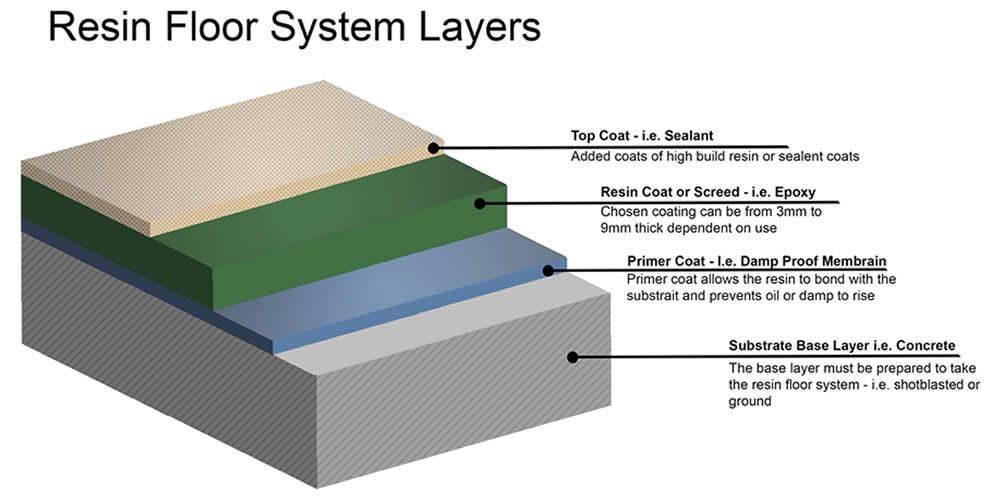
There are 8 resin floor classifications according to FeRFA (The Resin Flooring Association). These resins, typically epoxy, polyurethane and methacrylate, can be formulated to produce the different resin types.
Floor seal – Applied in two or more coats. Generally solvent or water-borne. This is Light Duty having a typical thickness of up to 150 μm
Floor coating – Applied in two or more coats. Generally solvent-free. This is Light/Medium Duty having a typical thickness of 150 μm to 300 μm
High build Floor coating – Applied in two or more coats. Generally solvent-free. This is Medium Duty having a typical thickness of 300 μm to 1000 μm
Multi-layer flooring – Aggregate dressed systems based on multiple layers of floor coatings or flow-applied floorings, often described as ‘sandwich’ systems. This is Medium/Heavy Duty having a typical thickness of less than 2 mm
Flow-applied flooring – Often referred to as ‘self-smoothing’ or ‘self-levelling’ flooring and having a smooth surface. This is Medium/Heavy Duty having a typical thickness of 2 mm to 3 mm
Resin screed flooring – Trowel-finished, heavily filled systems, generally incorporating a surface coating to minimize porosity and provide a wearing surface. This is Medium/Heavy Duty having a typical thickness of less than 4 mm
Heavy duty flowable flooring – Having a smooth surface. This is Heavy/Very Heavy Duty having a typical thickness of 4 mm to 6 mm
Heavy duty Resin flooring – Trowel-finished, aggregate filled systems effectively impervious throughout their thickness.
Some of the types of flooring may be produced with special decorative effects by the incorporation of coloured particles or flakes in the surface. Slip resistant or anti-static/conductive versions of these resins are also available.
How thick is an epoxy resin floor?
Epoxy resin floors vary in thickness dependent on the intended use:
Floor seal which is applied in two or more coats and is generally solvent or water-borne has a typical thickness of Up to 150 μm. The intended use is as a Light duty dust-proofing and sealing of concrete coat. Being Light duty Floor seal has an anticipated life of 1 to 2 years if used for light foot traffic and occasional rubber tyred vehicles and localised over-coating may be required. If used for regular foot traffic, frequent fork lift truck traffic and occasional hard plastic-wheeled trolleys, then floor seal is likely to last up to 1 year. Applied using a brush or roller, floor seal does not fill in any deviations in the floor surface and may be subject to impact damage. There is limited chemical Resistance with protection against occasional spillage of mild chemicals only. Floor seal is available in a uniform single colour or clear format.
Floor Coating which is applied in two or more coats and generally solvent-free has a typical thickness of 150 – 300 μm. Its intended use is for Light to medium duty traffic so the anticipated life span of a floor coating is 2 to 3 years if used for light foot traffic and occasional rubber tyred vehicles and just 1 to 2 years If used for regular foot traffic, frequent fork lift truck traffic and occasional hard plastic-wheeled trolleys and localised over-coating may be required. Floor coatings are applied using a brush, roller or squeegee and do not noticeably fill in any deviations in the floor surface and are liable to impact damage. Floor coatings have limited chemical resistance with protection against occasional spillage of mild chemicals only. Available in a uniform single colour or clear.
High build floor coating which is applied in two or more coats and generally solvent free has a thickness of 300 to 1000 μm. This is a medium duty resin with an anticipated life of 5 to 7 years for light foot traffic, occasional rubber tyred vehicles, 2 to 4 years for regular foot traffic, frequent fork lift truck traffic and occasional hard plastic-wheeled trolleys and not recommended for heavy duty use. The application of a high build floor coating is using a Roller, squeegee or spray. High build epoxy resin has good chemical Resistance – Good resistance to occasional spillage of some chemicals in the absence of mechanical damage and is available in a uniform single colour or clear format.
Multi-layer Flooring which is an aggregate dressed system based on multiple layers of floor coatings or flow-applied floorings, often described as ‘sandwich’ systems with a typical thickness of 2 mm upwards, depending on specification. This is a medium to heavy duty resin with an anticipated life of 3 to 5 years for light foot traffic, occasional rubber tyred vehicles, and 2 to 3 years (for 2.5 mm system) for constant forklift truck traffic, hard plastic wheeled trolleys with some impact. Multi-Layer Flooring has resistance to wear and impact damage and good resistance to occasional spillage. Available in Single or multi-coloured, also aggregate dependent.
Flow Applied Flooring often referred to as ‘self-smoothing’ or ‘self-levelling’ flooring and having a smooth surface (although may be given a surface dressing). With a typical thickness of 2 to 3 mm the intended use is for medium to heavy duty an anticipated life of 6 to 8 years for light foot traffic, occasional rubber tyred vehicles, and 3 to 4 years (for 2.5 mm system) for constant forklift truck traffic, hard plastic wheeled trolleys with some impact. The Application method is by trowel, pin rake, notched squeegee and finished with a spiked roller. Flow Applied Flooring has very good resistance and is available in uniform single colour or decorative effects. Suitability for food processing areas.
Screed flooring which is Trowel-finished, heavily filled systems, generally incorporating a surface coating to minimize porosity and provide a wearing surface and has a typical thickness of 4 mm upwards. The intended use of Screed flooring is Medium to heavy duty with an anticipated life of 10 to 12 years if used for regular foot traffic, frequent fork lift truck traffic, occasional hard plastic-wheeled trolleys and 5 to 7 years (provided seal coats are maintained regularly) when used for constant fork lift truck traffic, hard plastic wheeled trolleys with some impact. The application of a screed flooring is with a trowel or sledge spread and trowel-finished
Heavy Duty Flowable Flooring is an aggregate filled system having a self-smoothing surface (May be given a surface dressing). With a typical thickness of 4 – 6 mm the intended use of Heavy Duty Flowable Flooring is heavy to very heavy duty with an anticipated life of 8 to 10 years with constant fork lift truck traffic, hard plastic wheeled trolleys, some impact and 5 to 8 years with severe heavily loaded traffic and impact. Applied with a trowel or pin rake and finished with a spiked roller Heavy Duty Flowable Flooring has excellent impact resistance and very good resistance to chemical attack. Available in uniform single colour or decorative effect.
Heavy-Duty Screed Flooring is a trowel-finished, aggregate filled systems effectively impervious throughout their thickness. Applied in a typical thickness of 6 mm upwards Heavy-Duty Screed Flooring is intended for very heavy duty use with an anticipated life of 10 – 12 years with severe heavily loaded traffic and impact. Applied using a trowel or sledge spread and trowel-finished Heavy-Duty Screed Flooring has excellent impact resistance and excellent resistance to chemical attack. Available in a speckled uniform finish.
Is epoxy flooring expensive?
No, epoxy flooring is not expensive comparative to its lifespan. Starting from as little as £8-50 per sqm dependent on the system chosen, square area and thickness applied epoxy flooring is a versatile and cost effect flooring system for a variety of commercial and industrial applications. Widely chosen for its hardwearing nature and aesthetically pleasing finish epoxy resin flooring systems are the floor of choice for Pharmaceutical, Food & Drink, Automotive, Engineering, and Warehousing and Electronics Industries. Combined with its superior performance characteristics, and a life expectancy in excess of 20 years when specified and installed correctly, the initial installation cost when amortised over the lifespan makes it a very cost-effective option.
How much does it cost to epoxy a floor?
From as little as £8-50 per sqm dependent on the system chosen, square area and thickness applied. Widely chosen for its hardwearing nature and aesthetically pleasing finish epoxy resin flooring systems are the floor of choice for Pharmaceutical, Food & Drink, Automotive, Engineering, and Warehousing and Electronics Industries. Combined with its superior performance characteristics, and a life expectancy in excess of 20 years when specified and installed correctly, the initial installation cost when amortised over the lifespan makes it a very cost-effective option.
How long do Epoxy floors last?
In very general terms the Life expectancy of an epoxy resin floor will be proportional to the applied thickness of the synthetic resin flooring. Resin flooring is extremely tough and durable and can have a life expectancy in excess of 20 years when specified and installed correctly. In such cases the major share of the life cycle costs will be for regular cleaning and maintenance, which would apply for all types of flooring, but be less for resin flooring because of their superior performance characteristics. In addition, they can generally be refurbished by overcoating with a lower thickness than applied originally. The most appropriate flooring for any situation will depend upon the particular conditions to which it will be subjected. Many operational factors will directly affect the performance including the severity of trafficking (wheel type and loading), the frequency and efficiency of cleaning, mechanical handling abuse and impact, etc.
Floor seal – Being Light duty Floor seal has an anticipated life of 1 to 2 years if used for light foot traffic and occasional rubber tyred vehicles and localised over-coating may be required. If used for regular foot traffic, frequent forklift truck traffic and occasional hard plastic-wheeled trolleys, then floor seal is likely to last up to 1 year.
Floor Coating – Intended use is for Light to medium duty traffic so the anticipated life span of a floor coating is 2 to 3 years if used for light foot traffic and occasional rubber tyred vehicles and just 1 to 2 years If used for regular foot traffic, frequent fork lift truck traffic and occasional hard plastic-wheeled trolleys and localised over-coating may be required.
High build floor coating – This is a medium duty resin with an anticipated life of 5 to 7 years for light foot traffic, occasional rubber tyred vehicles, 2 to 4 years for regular foot traffic, frequent fork lift truck traffic and occasional hard plastic-wheeled trolleys and not recommended for heavy duty use.
Multi-layer Flooring – This is a medium to heavy duty resin with an anticipated life of 3 to 5 years for light foot traffic, occasional rubber tyred vehicles, and 2 to 3 years (for 2.5 mm system) for constant forklift truck traffic, hard plastic wheeled trolleys with some impact.
Flow Applied Flooring – With a typical thickness of 2 to 3 mm the intended use is for medium to heavy duty an anticipated life of 6 to 8 years for light foot traffic, occasional rubber tyred vehicles, and 3 to 4 years (for 2.5 mm system) for constant forklift truck traffic, hard plastic wheeled trolleys with some impact.
Screed flooring – The intended use of Screed flooring is Medium to heavy duty with an anticipated life of 10 to 12 years if used for regular foot traffic, frequent fork lift truck traffic, occasional hard plastic-wheeled trolleys and 5 to 7 years (provided seal coats are maintained regularly) when used for constant fork lift truck traffic, hard plastic wheeled trolleys with some impact.
Heavy Duty Flowable Flooring – the intended use of Heavy Duty Flowable Flooring is heavy to very heavy duty with an anticipated life of 8 to 10 years with constant fork lift truck traffic, hard plastic wheeled trolleys, some impact and 5 to 8 years with severe heavily loaded traffic and impact.
Heavy-Duty Screed Flooring – Intended for very heavy duty use with an anticipated life of 10 – 12 years with severe heavily loaded traffic and impact.
Floors which are kept clean will last longer. PSC Flooring will take the client through the choices available highlighting the parameters and deciding factors of their particular situation. With over 30 years’ experience in the application of resin floors, polyurethane flooring and epoxy floor coatings. We offer a total industrial flooring contractor package encompassing site survey, specification, surface preparation & product installation.
What are the benefits of epoxy flooring?
How do you prepare concrete for epoxy flooring?
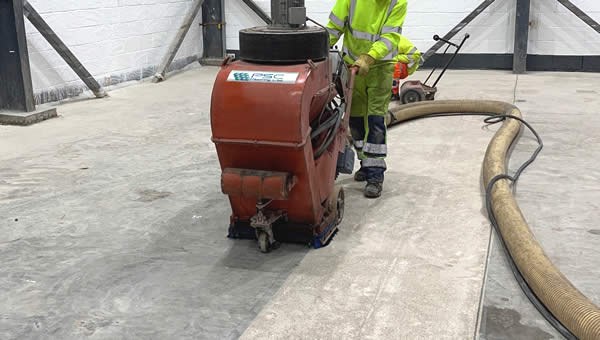
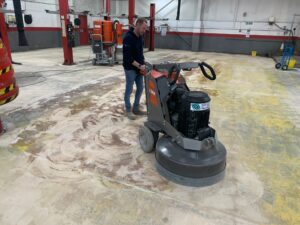
Is epoxy flooring safe?

Yes, epoxy flooring is safe for commercial, industrial and domestic application. Where there is a likelihood of water then the appropriate epoxy resin system is required. Widely chosen for its hardwearing nature and aesthetically pleasing finish epoxy resin flooring systems are the floor of choice for Pharmaceutical, Food & Drink, Automotive, Engineering, and Warehousing and Electronics Industries.Combined with its superior performance characteristics, and a life expectancy in excess of 20 years when specified and installed correctly, the initial installation cost when amortised over the lifespan makes it a very cost-effective option. With over 30 years’ experience in the application of resin floors, polyurethane flooring and epoxy floor coatings. We offer a total industrial flooring contractor package encompassing site survey, specification, surface preparation & product installation.
Will epoxy floors crack?
Is epoxy flooring scratch resistant?
How do you get scratches out of epoxy floor?
How do you clean an epoxy floor?
Is epoxy flooring waterproof?
Can you paint over epoxy floor?
How do I protect my epoxy floor?
Can you wax an epoxy floor?
What is the best flooring for a commercial kitchen?

A polyurethane screed minimum 6mm is recommended for commercial kitchens as it will give a seamless surface and a built-in anti-slip. Resin flooring is designed to adhere very strongly to concrete and in most cases within a commercial setting the common substrate is concreate however, epoxy resin can be applied to wood floors if necessary.The benefits of the polyurethane screed in the food industry is that the floors are hygienic – they are seamless, impervious and do not support microbial growth. A polyurethane screed offers the maximum chemical protection of all resin products and could easily withstand exposure to the numerous acids and chemicals that would be used in the area. Complemented by coving and render to allow for a smooth transition from wall to floor, makes heavy-duty polyurethane screed floor easy to clean, whilst providing a seamless “box” finish for high sterile processes in the food industry. A polyurethane 6mm screed can be washed down every day, a 9mm screed will allow for a steam clean daily.
What do you put on commercial kitchen walls?
How do you clean a commercial kitchen floor?
What is safety flooring?
In situations where ease of cleaning is more critical than slip resistance and/or where all who use or are likely to use the floor will wear specially provided slip resistant boots or shoes, the industry standard pendulum test values in the wet of not less than 33 may be deemed acceptable. Managing the slip resistance of any floor requires a regular and effective cleaning regime – If the incorrect cleaning regime is used, the floor surface will be subject to a build-up of contaminants, which could reduce the level of slip resistance. Advice should be taken from the specific resin manufacture as to the cleaning procedure that should be implemented however the general rule of thumb is that If your resin floor has a textured surface you should use brushes as opposed to mops to ensure all the variances in surface are cleaned.
Can you use epoxy resin on floors?
Are epoxy floors durable?

Yes, epoxy floors are durable. The amount of durability depends on the thickness of the epoxy resin coat applied. Resin flooring is designed to adhere very strongly to concrete. Widely chosen for its hardwearing nature and aesthetically pleasing finish epoxy resin flooring systems are the floor of choice for Pharmaceutical, Food & Drink, Automotive, Engineering, and Warehousing and Electronics Industries. Combined with its superior performance characteristics, and a life expectancy in excess of 20 years when specified and installed correctly, the initial installation cost when amortised over the lifespan makes it a very cost-effective option.With over 30 years’ experience in the application of resin floors, polyurethane flooring and epoxy floor coatings. We offer a total industrial flooring contractor package encompassing site survey, specification, surface preparation & product installation.
Can you use epoxy resin on wood floors?
What is anti-slip resin flooring?
In situations where ease of cleaning is more critical than slip resistance and/or where all who use or are likely to use the floor will wear specially provided slip resistant boots or shoes, the industry standard pendulum test values in the wet of not less than 33 may be deemed acceptable. Managing the slip resistance of any floor requires a regular and effective cleaning regime – If the incorrect cleaning regime is used, the floor surface will be subject to a build-up of contaminants, which could reduce the level of slip resistance. Advice should be taken from the specific resin manufacture as to the cleaning procedure that should be implemented however the general rule of thumb is that If your resin floor has a textured surface you should use brushes as opposed to mops to ensure all the variances in surface are cleaned.
Is epoxy flooring good for homes?
What is Food Grade Flooring?
Food Grade flooring is a heavy-duty polyurethane screed, laid at either 6mm or 9mm thick. The advantages of installing a polyurethane resin floor in food preparation areas:
Easily cleanable – can be steamed cleaned to 120 degrees at 9mm thick
Very hard wearing – can withstanding heavy loads
Hygienic & seamless – does not support bacteria and microbial growth
Can be laid to falls – to help drainage
Anti-slip in wet and dry working conditions
Can be complemented by coving and render – to allow for a smooth transition from wall to floor that does not support bacteria and microbial growth.
Food grade flooring is the normal choice of floor for bakeries, sugar confectionery, dairies, breweries including beer and cider production, wines, spirits and and whisky distilling, maltings, butchers, meat, poultry and fish processing, slaughterhouses / abattoirs, fruit and vegetable processing, restaurants, commercial kitchens and food manufacturers.
What is Coving?
Coving is a seamless connection between the floor and the wall/ vertical surface creating “one surface”. The addition of coving allows the floor material to extend seamlessly up the walls – it is recommended that a 100mm high coving is added to food safe screed flooring to create a link between the wall to floor finish and equipment toe-kicks (toe kick/floor junctures).
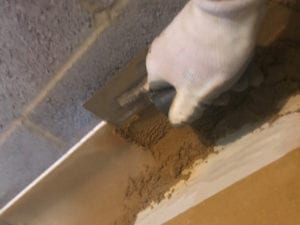
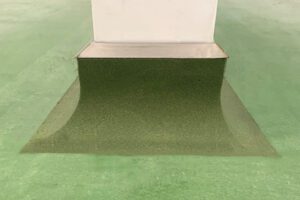
What is Coving made out of?
Coving is formed out of either epoxy or polyurethane mortar, and is typically installed using a coving trowel, which forms the shape of the cove. Coving is a curved, sealed finish, that allows for easy cleaning, and provides no room for bacteria to grow. The recommended height of the cove is100mm high coving to close the gap between the floor and the wall, and provide a waterproof surface to protect the wall.
What is the best floor for kitchens?
What’s the best epoxy for garage floors?
Is it worth it to epoxy garage floor?
How durable is epoxy garage flooring?
Does an epoxy garage floor increase home value?
Epoxy resin is available in a wide range of colours and is chemically resistant against oil, grease and fuel hence the choice for commercial vehicle workshops. Very hard wearing, with excellent wear resistance epoxy resin provides a gloss, attractive, easy to clean floor. In terms of installation it is a relatively quick process – The application of a high build floor coating is using a Roller, squeegee or spray and takes approximately 3 days from start to finish including drying time for a two coat system.
Does a finished garage floor add value?
How much does it cost to coat garage floor?
From as little as £8.50 per sqm dependent on the system chosen, square area and thickness applied. Widely chosen for its hardwearing nature and aesthetically pleasing finish epoxy resin flooring systems are the floor of choice for Pharmaceutical, Food & Drink, Automotive, Engineering, and Warehousing and Electronics Industries. Combined with its superior performance characteristics, and a life expectancy in excess of 20 years when specified and installed correctly, the initial installation cost when amortised over the lifespan makes it a very cost-effective option.
Is epoxy flooring safe for the home?
Yes domestic installations are carried out on a regular basis, however, this product is designed for industrial/commercial use. People have very high aesthetic expectations (and understandably so), when it comes to their living areas. Originally intended for industrial / commercial purposes where the floor area is much larger than a domestic situation, factors outside the contractor’s control may result in the floor not achieving a 100% perfect surface. Such so where a surface would be more than acceptable in an industrial facility, a homeowner would need to be accepting of the industrial look and finish.
What is Hydrostatic pressure?
Hydrostatic pressure is the pressure exerted by fluids at rest. When concrete slabs are appropriately installed beneath the ground’s water level, pressure builds against the walls of the slab. That pressure, as with any pressure, can accumulate over time. Adverse hydrostatic pressure is likely to occur in areas where the ground water table is higher than the substrate if external tanking has not been applied. In such cases pressure relief must be provided for example by direct drainage. As a flooring contractor a moisture meter is used to detect the moisture content of existing substraits/floors (usually a concrete slab).
What does a moisture reading mean?
A moisture meter / damp meter is a portable instrument, designed for measuring the moisture levels/ Hydrostatic pressure in a range of building materials such as wood, concrete, brick, and plasterboard.
Hydrostatic pressure may, under certain circumstances, cause adhesive failure between the flooring system and the substrate (existing floor). Where this is likely to occur, such as in areas where the ground water table is higher than the substrate, and where external tanking has not been applied, pressure relief must be provided e.g. by direct drainage.
As a flooring contractor a Protimter MMS2 instrument is an essential instrument used to detect the moisture content of existing floors. The search mode detects sub-surface moisture utilising pinless radio frequency finds moisture up to3/4 in (19 mm) below surface. Moisture readings of
0 to 169 – No risk of rising moisture
170 to 199 – At risk of rising moisture
200+ – Classified as wet
What is DPM?
DPM is the shortening for Damp Proof Membrane also known as epoxy resin primer. In terms of epoxy flooring systems if moisture comes into contact full bond strength may not be achieved. This in turn could result in blistering, partial delamination, or complete failure of the full resin system. In cases where the substrate has recently been installed and has not had adequate time to dry sufficiently, it would be advised that an epoxy resin damp proof primer is laid first, before any epoxy coating or screed system is installed to prevent rising moisture.
PSC Flooring recommend Resdev Pumaprime DPM – surface damp proof membrane & residual moisture suppressant is a two-component solvent-free liquid applied surface damp proof membrane and residual moisture suppressant. Resdev Pumaprime DPM is applied evenly using a notched trowel (1.5 mm x 5 mm V shaped) and flattened out with a pre-wetted-out short pile roller whilst still wet. After curing, Pumaprime DPM provides a surface membrane with excellent adhesion to damp concrete and polymer modified sand/cement screeds. Pumaprime DPM has been designed for use as a coating over cementitious surfaces which posses high levels of residual moisture or where an integral DPM is not present or not effective. Pumadur DPM permits early overlaying with vinyl, carpets, and resin-based products without the conventional “drying out” period being observed.
This product is not suitable for use over under-floor heating systems.
What is FeRFA?

What is Alcumus Safe Contractor Accredited?
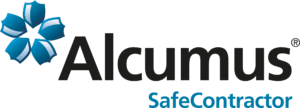

Where are PSC Flooring based?
PSC Flooring are based in Kidderminster, in the heart of Worcestershire, approximately 20 miles south west of Birmingham.
What geographical areas do PSC cover?
At PSC we cover the majority of counties across England and Wales including; Bedfordshire, Berkshire, Bristol, Buckinghamshire, Cambridgeshire, Cheshire, Cornwall, County Durham, Cumbria, Derbyshire, Devon, Dorset, East Riding of Yorkshire, East Sussex, Essex, Gloucestershire, Greater London, Greater Manchester, Hampshire, Herefordshire, Hertfordshire, Kent, Lancashire, Leicestershire, Lincolnshire, Merseyside, Norfolk, North Yorkshire, Northamptonshire, Northumberland, Nottinghamshire, Oxfordshire, Rutland, Shropshire, Somerset, South Yorkshire, Staffordshire, Suffolk, Surrey, Tyne and Wear, Warwickshire, West Midlands, West Sussex, West Yorkshire, Wiltshire, Worcestershire, Clwyd, Dyfed, Gwent, Gwynedd, Mid Glamorgan, Powys, South Glamorgan and West Glamorgan.
Who are PSC’s preferred resin suppliers?
At PSC we are very particular to give the client only the highest quality products and finishes. PSC have worked with our main suppliers Resdev, KDR and DCP for a number of years. PSC has a strong ambition to contribute to sustainable growth. For us, it’s of vital importance that we have close working relationships and interact with all our suppliers. We will only work with suppliers that have high performance as regards delivery time scales, quality products and environmental sustainability. We are assured that all their products have have been tested and certified to meet standards.
Established in the 1970’s and remaining fully in the hands of the Wright family since its inception, Resdev Limited manufacture specialist seamless, hygienic, epoxy and polyurethane resin floor, wall and car parking deck systems for application throughout UK and worldwide.
- Resdev Pumatect is a two-component, virtually solvent free High Build epoxy floor coating offering excellent abrasion and chemical resistance. Pumatect provides a tough, hard wearing coating for medium duty traffic giving high film build and wear resistance – ideal for Warehousing, Light industrial and engineering, vehicle workshops etc. 0.4mm (total for 2 coats) coloured high build epoxy floor coating with a gloss finish.
- Resdev Pumathane is a High build flexible polyurethane coating for line marking with a UV resistant gloss finish. Designed to create demarcation lines between traffic and pedestrian areas as well as informative signage, Pumathane LM UVR is easy to apply with a degree of flexibility and resistance to UV yellowing.
- Resdev Pumadur is hygienic and safe flooring for industrial process, preparation and manufacturing. Available in a range of coatings and coving products through to self-smoothing and heavy duty screed flooring. Pumadur Polyurethane is a self-smoothing and heavy duty screed flooring that incorporates specialised graded aggregate and fillers, perfect for heavy duty applications. Pumadur Polyurethane Flooring Systems are ideal for Chemical processing & storage, Food processing & manufacture, Pharmaceutical & healthcare, Cold storage/freezers, Breweries & dairies, Printing, Engineering, Production & warehousing. Easy to clean and maintain providing a hardwearing, long-lasting answer for industrial and prestigious installations alike.
- Resdev Pumaprime DPM is a Solvent free liquid applied surface damp proof membrane and residual moisture suppressant. Pumaprime liquid DPM provides a surface membrane with excellent adhesion to damp concrete and polymer modified sand/cement screeds.

KDR Resin Systems Ltd is an independent, family owned UK manufacturer of seamless Resin Floor, Wall and Coving solutions for all Industrial & Commercial sectors. Formed in 2013 KDR have grown to become a leading supplier of Epoxy, Polyurethane Coatings, Screeds and Polyaspartic resin systems in the UK.
Don Construction Products (DCP) are construction materials manufacturers who have extensive experience in developing, manufacturing, and marketing construction materials for civil engineering and the construction industry across the globe since 1927..
- DCP Cemflow Cementitious Flooring is a range of Industrial grade self-levelling floor screeds and toppings designed to rejuvenate an existing substrate. Available in a wide variety of specialist formulas, DCP Cemflow products are rapid drying and high strength.


